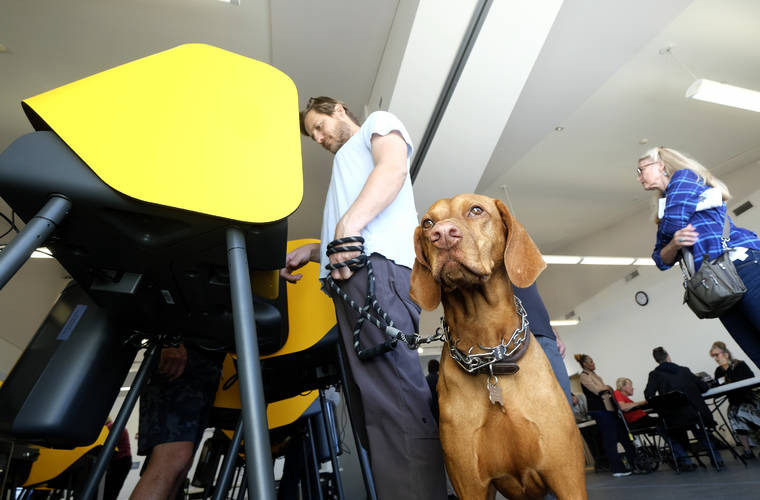Deadly tornadoes knocked out polling places in Tennessee while fears over the coronavirus left some polling places in California and Texas short of election workers as Super Tuesday voting was underway around the country.
Scattered reports of polling places opening late, machines malfunctioning or voter rolls being down temporarily disrupted voting in some of the 14 states voting Tuesday, but there were no reports of voters being unable to cast a ballot or security breaches.
Just hours before polls were set to open in Tennessee, tornadoes tore through parts of the state, destroying at least 140 buildings and killing at least 22. With more than a dozen polling sites in Nashville’s Davidson County damaged, voters were sent to other locations, where some of them encountered long lines.
The Tennessee Democratic Party and the presidential campaigns of Joe Biden, Mike Bloomberg, Bernie Sanders and Elizabeth Warren successfully sued Davidson County election officials and the secretary of state’s office to extend voting for three hours beyond the scheduled 7 p.m. closing time.
In Texas, voting got off to a slow start in Travis County, home to Austin, because many election workers did not show up, with some citing fears of contracting the coronavirus, according to the county clerk’s office. The election office said it began implementing emergency procedures, with elections staff and other employees filling in as poll workers.
Another county, in California, addressed concerns over the coronavirus by sending bottles of hand sanitizer to polling places and asking poll workers to post fliers from the public health department on how to avoid spreading the virus.
Jesse Salinas, the chief elections official in Yolo County, just west of Sacramento, said about 10% of poll workers backed out at the last minute, and he pointed to concerns about getting the virus. He said that’s about double what is normal for an election, and sent his team scrambling for replacements.
“We are hoping people remain calm and still participate in the election process,” Salinas said.
Super Tuesday marked the first major security test since the 2018 midterm elections, with state and local election officials saying they are prepared to deal with everything from equipment problems to false information.
States have been racing to shore up cybersecurity defenses, replace aging and vulnerable voting equipment, and train for worst-case scenarios since it became clear that Russia had launched a sweeping and systematic effort to interfere in the 2016 presidential election.
Voter file databases were down briefly in some counties in California, Texas and elsewhere, but access was restored relatively quickly. Christopher Krebs, director of the Cybersecurity and Infrastructure Security Agency, described the glitches as “intermittent I.T. issues” that had since been resolved.
“All the systems are back up online,” he said. “We’re not aware of any persistent, long-term issues associated with the election infrastructure of the United States right now.”
In Minnesota, a poll-finding tool on the secretary of state’s website was briefly inaccessible on Tuesday. Republicans cried foul when visitors to the site were redirected to a left-leaning website that also supplied polling place information. Secretary of State Steve Simon said a staff member had linked to the partisan site in what he called “a serious lapse of judgment.”
It wasn’t immediately clear why the poll-finder was inaccessible. Simon said there was no evidence the state’s voting systems were hacked or interfered with, but his office didn’t immediately respond to a message from The Associated Press about the reason for the website outage.
U.S. intelligence chiefs have warned that foreign interference remains a threat for the 2020 election, but the national agency that oversees election security said Tuesday it had not detected any notable uptick in either misinformation by foreign nations or targeted attacks on voting equipment.
The agency says it has taken steps since the 2016 elections to improve overall security and develop better coordination with state and local election officials, and it praised authorities in Tennessee for quickly making contingency plans to help voters in areas devastated by the severe weather in that state.
In that state, election officials scrambled to make sure people could still cast their ballots. Nashville Mayor John Cooper said alternate sites were arranged for 15 polling places out of the 169 precincts in Nashville’s combined city-county area. Davidson County Administrator of Elections Jeff Roberts said voters from anywhere in the county could go to two so-called “supersites” to cast their ballots.
High winds also briefly disrupted voting in central Alabama. In rural Bibb County, southwest of Birmingham, cellphone alerts began going off with a tornado warning about 6:45 a.m., just as poll workers were getting ready to open a polling place in a senior center, said volunteer Gwen Thompson.
The storm knocked out electricity, she said, but the precinct’s two electronic voting machines had battery backups and a few people had cast ballots less than an hour later.
“We’re voting by flashlight,” Thompson said.
———
Cassidy reported from Atlanta; Sainz reported from Memphis.
———
Associated Press writers Frank Bajak in Boston, Jill Bleed in Little Rock, Arkansas, Jake Bleiberg in Dallas, Kate Brumback in Atlanta, Ben Fox and Eric Tucker in Washington, D.C., Doug Glass in Minneapolis, Jonathan Mattise in Nashville and Jay Reeves in Birmingham, Alabama, and contributed to this report.


